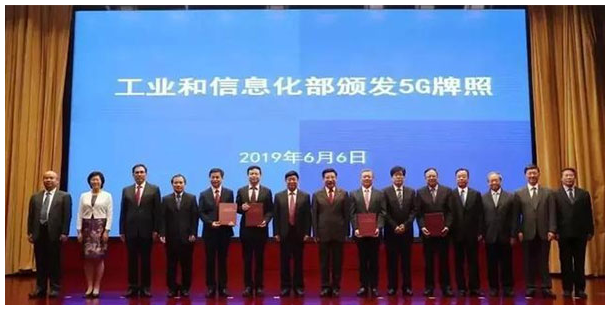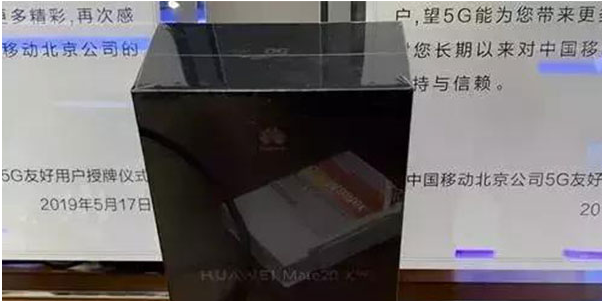On the 6th, the Ministry of Industry and Information Technology issued 5G commercial licenses to China Telecom, China Mobile, China Unicom, and China Radio and Television. In 2019, China officially entered the first year of 5G commercialization.
On May 5, 2016, the Ministry of Industry and Information Technology issued a Basic Telecommunications Business Operation License to China Broadcasting and Television Network Co., Ltd., approving the company to operate domestic data transmission services and domestic communication facility services on the Internet nationwide. This also means that China Radio and Television has become the fourth largest basic telecommunications operator after China Mobile, China Telecom, and China Unicom.

5G is really here, and netizens are discussing it. 'I just bought a phone, do I still need to change it?' 'Will the tariff be a bit cheaper?' 'How much is a 5G phone?'
What is a 5G license plate?
Just like car owners who need to obtain a driver's license before driving on the road, telecom operators need to have a 5G commercial license to operate and provide 5G services.

5G is really here, and netizens are discussing it. 'I just bought a phone, do I still need to change it?' 'Will the tariff be a bit cheaper?' 'How much is a 5G phone?'
What is a 5G license plate?
Just like car owners who need to obtain a driver's license before driving on the road, telecom operators need to have a 5G commercial license to operate and provide 5G services.

It is understood that China Unicom has started building 5G networks in 40 cities, especially deploying continuous 5G urban coverage in seven cities: Beijing, Shanghai, Guangzhou, Shenzhen, Nanjing, Hangzhou, and Xiong'an.
China Mobile has launched 5G scale trials in 17 cities, including trials in Hangzhou, Shanghai, Guangzhou, Suzhou, and Wuhan, as well as application demonstrations in 12 cities including Beijing, Chengdu, and Shenzhen.
China Telecom also stated that it has conducted 5G trials in 8 cities including Beijing.
In addition to operators, the broadcasting and television system has also obtained valuable 5G licenses to participate in 5G.
Do you need to change your phone?
If you want to use 5G network, you definitely need to switch to a 5G phone, which is beyond doubt. Fortunately, a batch of 5G terminals can immediately meet users, such as Huawei Mate 20 X 5G version, Samsung S10 5G version, Xiaomi Mix 3 5G version, OPPO Reno 5G version, vivo NEX 5G version, ZTE Tianji AXON 10, etc.
However, currently these phones are priced quite high, with tens of thousands of yuan being basically 'standard'.
Independent telecommunications analyst Fu Liang suggests that users should not be in a hurry to get started. They can often go to the operator's business hall to learn about the progress. After March next year, the price of 5G phones is about 6000 yuan; In the fourth quarter of next year, the price is about 2000 yuan, and it has most of the performance of the current 10000 yuan mobile phone.
The good news is that unlike when transitioning from 3G to 4G, users need to change their cards. According to previous announcements from the three major operators, users can experience 5G high-speed internet and voice services without changing their cards or numbers, saving a lot of trouble.

Will 4G phones be phased out?
'I just bought a new phone, you're telling me this now.' Some netizens have doubts, 'does this mean that my 4G phone is going to be phased out?'
In fact, it cannot be said that there are still a large number of 2G users in the 4G era, who are still using 2G phones.
So users who are not in a hurry to experience 5G networks can continue to use their current 4G phones, and the three major operators can still provide good 4G network support. Moreover, the current 4G network speed is also very fast. In the absence of widespread applications such as 5G high-definition video, 4G networks can also meet the daily needs of users.
Is the 5G tariff expensive?
In 2013, when 4G was first introduced, netizens had a joke about 'not shutting down 4G overnight, the house belongs to the telecommunications operator'. Will the traffic tariff be very expensive with the arrival of 5G?
Communication industry expert Xiang Ligang said in an interview that the price of traffic is measured by the level of base station technology. With the advancement of technology, 'in 5G, the price of 1G traffic may be 1 yuan or 50 cents.'
It should be noted that in the 4G era, user traffic has increased from MB to GB, and in the 5G era, user traffic will also increase. The specific cost will depend on user traffic and carrier package pricing, but a trend is that the unit price of traffic will become cheaper.
How to make money from the business opportunities brought by 5G?
Regarding the business model in the 5G era, Yang Guang, General Manager of the Industry and Business Cooperation Department of China Mobile Communications Research Institute, has outlined such a picture.
The first is the traditional to C mode, which involves buying data to access the internet. The business model of this 4G era will definitely not disappear.
The second type is the to B model, which provides customized services for industries such as energy, healthcare, and education using 5G technology. For example, providing an exclusive connection for information transmission and collection in the energy industry is a customized service that ensures the quality and safety of information transmission and collection.
This may adopt a completely new business model, not charging based on traffic, but based on the value of the service, such as how much it costs to open a customized service and how much it costs to call a customized service capability.
The third category is to B plus to C, for example, connected drones. 5G empowers the civilian drone industry, forming 5G network drone services and products, ultimately providing services to individual users. For example, networked drones, unmanned aerial vehicles, remote medical services, etc. are used in the logistics industry.
5G, come on!
(Source: CCTV News, Xinhua News Network Sike, China News Network, People's Post and Telecommunications News, etc.)